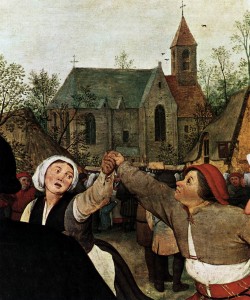 Writing for the Daily Beast, Joel Kotkin on Pope Francis’s Laudato Si:
Writing for the Daily Beast, Joel Kotkin on Pope Francis’s Laudato Si:
With Francis’s pontifical blessing , the greens have now found a spiritual hook that goes beyond the familiar bastions of the academy, bureaucracy, and the media and reaches right into the homes and hearts of more than a billion practicing Catholics. No potential coalition of interests threatened by a seeming tsunami of regulation—from suburban homeowners and energy firms to Main Street businesses—can hope to easily resist this alliance of the unlikely.
That may (yet) overstate the impact that the Pope, raging against the Devil one day, against air conditioning the next, may actually have, but it is a reminder of just how foolish it was of Speaker Boehner to invite Francis to speak to a joint session of Congress. It’s true that the encyclical had yet to appear when the invitation went out, but the fact that Francis is a profoundly political pope was no secret, and nor was the nature of his essentially Peronist politics.
But back to Kotkin:
There are of course historical parallels to this kind of game-changing alliance. In the late Roman Empire and then throughout the first Middle Ages, church ideology melded with aristocratic and kingly power to assure the rise of a feudal system. Issuing indulgences for the well-heeled, the Church fought against the culture of hedonism and unrestrained individualism that Francis has so roundly denounced. The Church also concerned itself with the poor, but seemed not willing to challenge the very economic and social order that often served to keep them that way.
Historically Medievalism represented a “steady state” approach to human development, seeking stability over change. Coming after the achievements of the classical age—with its magnificent engineering feats as well as an often cruel, highly competitive culture—the Middle Ages ushered in centuries of slow growth, with cities in decline and poverty universal for all but a few.
There’s something else though. The medieval church’s preference for ‘stability’ may or may not have been influenced by its perception that this was somehow better for the poor than any alternative (I doubt it), but it did have quite a bit to do with its realization that innovation and affluence represented a dangerous threat to its position in the intellectual, political and social order.
That, I suspect, is something that bothers Francis, who is no free spirit.
Kotkin’s article contains so much that it seems invidious just to post a few extracts (read the whole thing, really), but here goes:
What makes the Pope’s position so important—after all, the world is rejecting his views on such things as gay marriage and abortion—is how it jibes with the world view of some of the secular world’s best-funded, influential, and powerful forces. In contrast to both Socialist and capitalist thought, both the Pope and the greens are suspicious about economic growth itself, and seem to regard material progress as aggression against the health of the planet….
… Given their lack of faith in markets or people, the green movement has become ever less adept at adjusting to the demographic, economic, and technological changes that have occurred since the ’70s. Huge increases in agricultural productivity and the recent explosion in fossil fuel energy resources have been largely ignored or downplayed; the writ remains that humanity has entered an irreversible “era of ecological scarcity” that requires strong steps to promote “sustainability.”
…Ultimately the green platform seeks not to increase living standards as we currently understand them (particularly in high income countries) but to purposely lower them. This can be seen in the calls for “de-development,” a phrase employed by President Obama’s science advisor John Holdren for all “overdeveloped” advanced countries, in part to discourage developing countries from following a similar path.
So Prince Charles, another individual whose, so to speak, business flourishes best in ‘steady state’ societies, turns out, Kotkin explains, to be something of a fan of the slums of Bombay, which apparently offer more “durable ways of living” for the developing world than those available in the suburbanized west, a comment steeped in the revolting blend of ignorance, condescension and smugness all too typical of the heir to the British throne. May the Queen live to be 120!
Kotkin does, however, note the encouraging (and entertaining) prospect that the ideas of the self-proclaimed ‘Pope of the poor’ will be rejected by, well, the poor:
Trying to sell anti-growth green ideology may prove a tougher in the developing world. Not surprising then that, no matter what the rhetoric that is adopted by the climate conference to be held in Paris this month, critical figures like India’s Prime Minister Narendra Modi will not restrict building new coal plants—the country has tripled coal imports three fold since 2008. In the sweltering cities of the subcontinent, moves to ban air conditioning are simply not good politics. And Chinese President Xi Jinping, the leader of the world’s largest carbon emitter and user of coal, clearly has no real intention of reversing rapid development, based in large part fossil fuels, till 2030, when reasonably priced alternatives may well be generally available.
And then there’s this:
Architect Austin Williams suggests that sustainability, the new prayer word of spiritual greenism, “is an insidiously dangerous concept, masquerading as progress.” It poses an agenda that restricts industry, housing and incomes in a manner that severely undermines social aspiration. Indeed, Williams argues, greens and their allies—now including the world’s most important church—have created “a poverty of ambition.” Williams suggests the common green view is that humanity is “destructive and in need of reduction” rather than “a source of innovation, creativity, imagination and socialization.”
That is a profoundly anti-humane and, yes, dispiriting view. That Pope Francis has chosen to come so close to it says a great deal, little of it good.
Full Kotkin piece here (For some mysterious reason, I still cannot link): http://www.thedailybeast.com/articles/2015/07/05/green-pope-goes-medieval-on-planet.html
